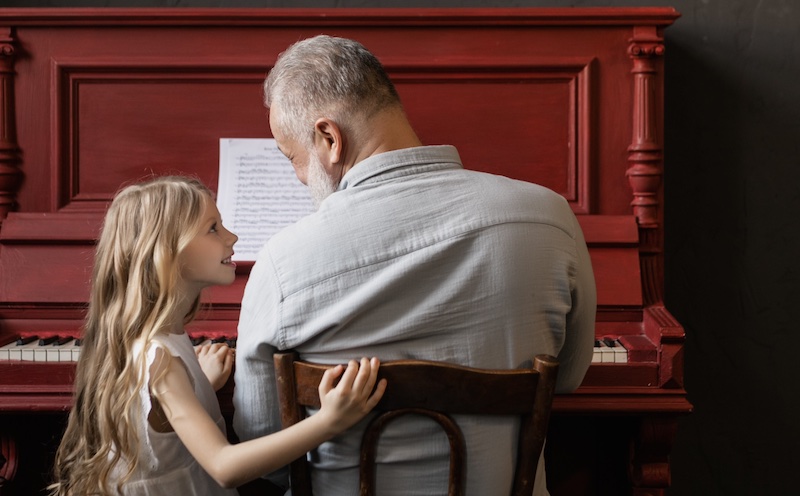Aside from knowing how to play the piano yourself, what are ways to start teaching piano? Once you've started teaching, what are avenues for continuing to improve your teaching craft?
Sometimes, all it takes is playing piano in public to be asked for piano lessons. This may take you by surprise or you may have been hoping to get a student, but everyone starts somewhere!
 |
| "Will you teach me?" |
No matter how you get your first student, you will have questions and maybe some hesitancy to start on this journey.
Here are 5 steps for beginning piano teachers:
1. Be willing to try and fail.
Believe it or not, failing as a piano teacher happens the moment you decline because of feelings of inadequacy. Failure happens before you even started! While I can't speak to your specific situation, I believe that if you have put in the time to learn piano; maybe 5 years of consistent lessons, practice, and performance experience, becoming a piano teacher is possible.
Certainly, if a student eventually surpasses your skill level and knowledge, be honest. You may fit as a practice coach and an encouraging, helpful constructive critic. You may refer this person to a more skilled pianist that you trust or that your student finds. You will cross that bridge when you come to it!
If you have a desire to teach piano, have confidence to start a beginner who is interested. You have to start somewhere just as much as a piano student has to start somewhere. If your thoughts say, "I'm not good enough," say, "I would like to teach and I am committed to continuing to learn and grow in this skill." Making mistakes is part of the process.
2. Ask yourself who, what, where, when, why, and how.
- Who? Will you market your studio or just use word of mouth?
- What? What level? What style?
- Where? Have a location to meet with a piano, whether that is your house, their house, a music school, or a local church that you rent.
- When? Look at your calendar and determine your availability. Remember to consider prep time and follow up time.
- You're Big Why: What is your purpose in life? How does teaching piano serve you towards that purpose? What are your goals?
- How? Decide your method series and other curriculum.
I have written posts about starting up an independent studio:
Resources that have been so helpful to me:
- The Independent Piano Teacher's Studio Handbook by Beth Gigante Klingenstein
- How to Teach Piano Successfully by James Bastien
- Chopin: pianist and teacher as seen by his pupils edited by Jean-Jacques Eigeldinger
- Faber Piano Adventures website
Consider taking a piano pedagogy course at a local college or online:
- Valley City State University - I took Applied Pedagogy and Piano Pedagogy online here.
In addition, you may want to pursue continued piano lessons with a professor of music or even pursue a bachelor's degree in music. I personally earned a Bachelor of Arts in Music, however, I don't believe that this a pre-requisite to start teaching.
Other blogs that I recommend:
- Color In My Piano by Joy Morin
3. Create Lessons Plans
Having a list of activities and a general idea of time commitment is very important.
As you teach, you will find that the student may need extra attention in a different area or even have questions that they would like to explore. Write your plan in pencil; have flexibility. However, you need to have a direction.
Do not become a "turn the page" teacher. Have supplemental games, apps, worksheets, and activities ready to go. I refer to Joy Morin's Color In My Piano blog regularly as she has created many engaging games and activities (many of them are free to print!). She is a huge source of inspiration to me. I definitely suggest finding teaching blogs that you are drawn to and consulting them regularly for relevant activities and new teaching ideas.
4. Familiarize yourself with the method.
Have your own copy of all the books you are planning to use.
Read through the table of contents and all of the concept pages. Use these as springboards for supplemental games and activities to reinforce. You don't need to go in order and you can present ideas sooner than the book. That way your student will be ready for future challenges in their music as it incrementally gets harder.
Play through all the music and spend time practicing any songs that are difficult for you. Write down how you learned the pieces and think through your approach. What are the patterns? The form? What notes need to be reviewed? What articiulations are present and what technique do you use to create those articulations? How will you teach this to someone else?
If you are using a no-book method or passing down a skill by demonstration, such as playing pop chords or in the jazz style, have a structure and outline of how and when you will present new concepts incrementally. Have a list of songs you will teach and any reference materials that will be helpful for the student printed and attached to follow up lesson notes.
I use a spreadsheet where I write which pages I will assign, what concepts we will cover, and what activities tie in. Doing this in one large batch gets the hard part of brainstorming out of the way early. When lessons come, I can refer to my chart and plug those into my lesson notes.
5. Lesson Structure
Keep your introductions short, try to avoid long conversations that are off topic. Every situation is different, but avoid spending more than 5 minutes catching up.
Be open to a student opening their book to show you their progress. If you would like to encourage a more spontaneous day, ask "What would you like to show me first?" or "What topic or skill would you like to work on today?"
As the student is playing, avoid looking at the music score. Instead, watch their hands, body movements, flexibility, and relaxation. Give constructive, positive comments. Avoid reacting to each missed note. Instead, find a way to communicate how to be expressive with music.
Oftentimes, students will tell me it was perfect at home, but in front of me it's not. I do whatever I can to help my students feel comfortable, but I always keep in the back of mind how hard it is to play for someone who knows what the music is supposed to sound like. You will be able to tell if they worked on it. If they did, have stickers ready! Find something that sounded great to comment on. Demonstrate a way to vary the dynamics or articulation.
After the lesson, type up your notes, detail the assignments, and email them to your student.




No comments:
Post a Comment